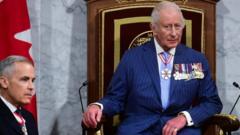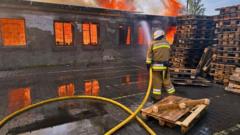King Charles' recent Throne Speech reinforced Canada's commitment to assert its independence amid rising tensions with the United States, while outlining priorities for Prime Minister Mark Carney’s administration. The speech articulated critical themes such as national pride, economic growth, and the need for military enhancements in an increasingly complicated geopolitical environment.
**Canada Defines its Path: Key Highlights from King Charles’ Throne Speech**

**Canada Defines its Path: Key Highlights from King Charles’ Throne Speech**
In a significant address, King Charles articulated Canada’s objectives in a changing global landscape, emphasizing sovereignty, economic transformation, and domestic challenges.
In his inaugural Throne Speech, King Charles emphasized Canada’s determination to navigate uncertain global waters and reaffirmed its sovereignty amidst fraught relations with the United States. The speech was particularly relevant as it introduced the priorities for Prime Minister Mark Carney following his victory in April's general elections.
Among the key themes of the address was a direct assertion of Canada’s identity and unity, with an underlying message subtly aimed at the US, articulated through a celebration of Canada’s unique character and achievements since Queen Elizabeth II last opened Parliament in 1975. King Charles noted, “The Crown has for so long been a symbol of unity for Canada,” while also appreciating the nation’s growth into an "ambitious and innovative" entity that stands "strong and free.”
The King addressed the international landscape by recognizing unprecedented challenges confronting Canada, particularly in the context of shifting global trade systems. He underscored the necessity for Canada to strengthen trading partnerships, especially with European allies, and highlighted the moment as an "incredible opportunity" for transformative economic measures, asserting the potential for the most significant economic evolution in Canada since the Second World War.
As part of his focus on domestic policies, King Charles highlighted Carney’s plans to accelerate major infrastructure initiatives and support for Indigenous ownership in large projects. Notably, new legislative measures are anticipated by July to help alleviate interprovincial trade barriers, estimated to financially impede the country significantly each year.
King Charles also addressed pressing issues surrounding housing affordability and crime, asserting the government’s commitment to rapidly increase housing stock with ambitious targets and investment in innovative solutions. Moreover, the government aims to create a stronger legislative framework to combat crime, including severe penalties for car thefts and human trafficking.
Lastly, in response to mounting international pressure, particularly from NATO allies, the address included promises to bolster defense spending. Carney reaffirmed a commitment to meet the NATO target of 2% of GDP by 2030 and highlighted plans to enhance Canada’s military capabilities as well as its defense relationships with European partners.
Overall, King Charles’ speech encapsulates Canada’s aspirations for stability, growth, and resilience, setting a strategic direction for the current administration in confronting both domestic challenges and global dynamics.




















